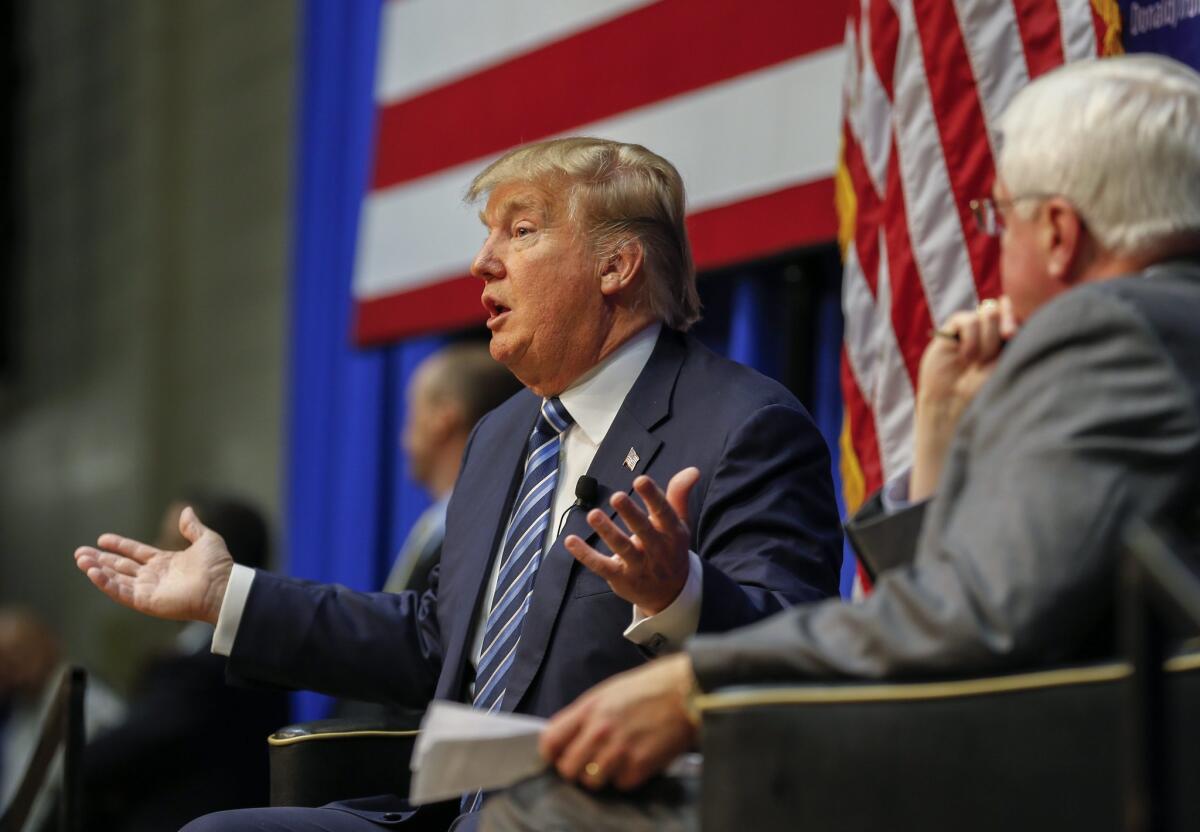Op-Ed: Donald Trump believes he was born to be king

Republican presidential candidate Donald Trump participates in a campaign town hall event at Wofford College in Spartanburg, S.C. on Nov. 20.
- Share via
For months the political press has been grappling with the greased-pig problem that is Donald Trump, trying to pin down the Republican front-runner as he defies establishment expectations and rejects basic standards of decorum. Much of the time I devoted to my Trump biography was consumed with the same activity: I spent countless hours fact-checking the torrent of slippery claims he made during our interviews. Even more difficult was divining the source of his sense of entitlement.
As campaign reporters are now coming to realize, Trump is not concerned with anyone’s dignity, even his own, and will readily deploy lies and distortions when they serve as applause lines. None of the Trump claims checked by Politifact has turned out to be absolutely true by its standards, while 30 have been judged false or, worse, “pants on fire” statements. Yet Trump refuses to correct himself and, instead, ups the ante. Recently he tweeted race-baiting false statistics that appeared to have originated from a neo-Nazi source.
Like history’s monarchs, Trump believes that the qualities that make him successful are in-born.
Some who try to understand why Trump would do such things might wonder if he’s a deeply wounded, insecure soul compensating with narcissistic bluster. This diagnosis doesn’t fit the Trump who answered my questions for many hours, nor does it match the conclusion reached by his second wife, Marla Maples. “He’s a king,” said Maples when I interviewed her. “I mean truly. He is. He’s a king. He really is a ruler of the world, as he sees it.”
Maples suspects that Trump was a royal figure in some past life. More likely he acquired his reverse noblesse oblige by training from his father who, according to Trump biographer Harry Hurt III, raised young Donald to become “a killer” and told him “you are king.” His mother was so enchanted by royalty that Trump keenly remembers the hours she spent watching the TV broadcast of Queen Elizabeth’s coronation.
Trump’s sense of entitlement has been affirmed throughout his life. In 1987, at a party marking the publication of Trump’s book “The Art of the Deal,” boxing promoter Don King turned to the crowd and proclaimed the arrival of Trump and his then-wife Ivana by saying, “Here’s the king and the queen!” A few years later, when he appeared at an event at one of his Atlantic City casinos, an announcer bellowed, “Let’s hear it for the king!” — and Trump burst through a large paper screen. When he visited the humble village of his Scottish ancestors he told his relatives that because of his TV show “The Apprentice,” he was American royalty. “If you get ratings, you’re king, like me. I’m a king. If you don’t get ratings, you’re thrown off the air like a dog.”
Like history’s monarchs, Trump believes that the qualities that make him successful are in-born. He once said he possesses a genetic “gift” for real estate development.
“I’m a big believer in natural ability,” Trump told me during a discussion about his leadership traits, which he said came from a natural sense of how human relations work. “If Obama had that psychology, Putin wouldn’t be eating his lunch. He doesn’t have that psychology and he never will because it’s not in his DNA.” Later in this discussion, Trump said: “I believe in being prepared and all that stuff. But in many respects, the most important thing is an innate ability.”
Perhaps Trump’s conviction that DNA — not life experience — is everything explains why he proudly claims that he’s “basically the same” today as when he was a boy. “When I look at myself in the first grade and I look at myself now, I’m basically the same,” he said. “The temperament is not that different.”
Academic research popularized by Malcolm Gladwell in his 2002 essay “The Talent Myth” demonstrates that achievement depends more on dedication and experience than in-bred ability. But this message is lost on many well-to-do Americans who, researchers have found, believe their wealth affirms their innate superiority. The better-off are also more inclined to believe that “people get what they are entitled to have.”
Trump has handed down his sense of entitlement to the next generation. His son Donald Jr. told me: “Like him, I’m a big believer in race-horse theory. He’s an incredibly accomplished guy, my mother’s incredibly accomplished, she’s an Olympian, so I’d like to believe genetically I’m predisposed to [be] better than average.”
The notion that Donald Jr.’s mother, Ivana Trump, was an Olympic skier in 1972 persists even though her country, Czechoslovakia, fielded no team. Her son not only believes the tall tale, he’s convinced that it affirms his own superiority. “I’m in the high percentile on the bell curve,” he said. He then added that his father’s abilities are even greater. “That’s what separates him from everyone I know.”
The racehorse theory of human development explains Trump’s belief in his suitability for political leadership, despite the fact that he has never held office. He’s absolutely convinced that America’s problems will be solved by his God-given management skills, bankruptcies notwithstanding. You are either born with superior qualities — the right DNA — or you are not. And people get what they deserve. In his case, that includes the White House.
Michael D’Antonio is the author of “Never Enough: Donald Trump and the Pursuit of Success.”
Follow the Opinion section on Twitter @latimesopinion and Facebook
More to Read
A cure for the common opinion
Get thought-provoking perspectives with our weekly newsletter.
You may occasionally receive promotional content from the Los Angeles Times.










